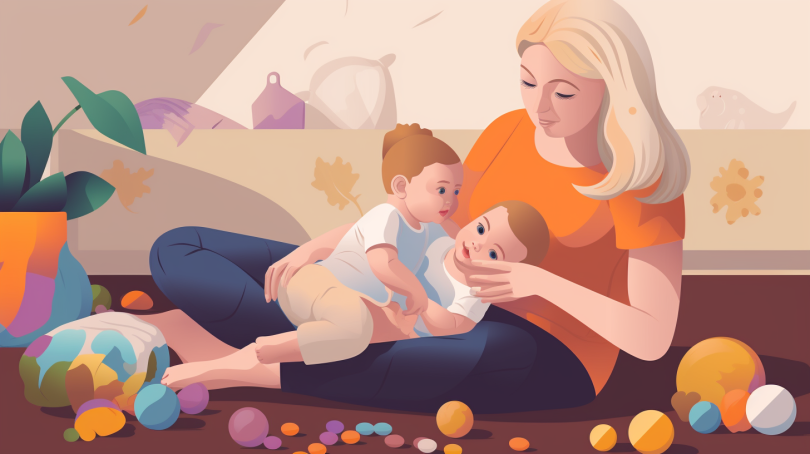When Does Parent-Child Bonding Begin: Understanding the Early Stages of Connection
Parent-child bonding is a crucial part of a child’s healthy development. It lays the foundation for a secure and positive parent-child relationship, which can have long-lasting effects on children’s emotional, cognitive, and social well-being. But when does parent-child bonding begin? Is it something that happens immediately after birth, or does it take time to develop? In this blog post, we’ll explore the early stages of parent-child bonding, including its benefits and challenges, and offer practical tips and solutions to help parents foster a strong connection with their children.
The Importance of Parent-Child Bonding
Parent-child bonding is the emotional connection that forms between a parent and child. It’s the process by which parents and children learn to trust each other, communicate effectively, and form a strong attachment. Research has shown that parent-child bonding is critical to children’s healthy development in several ways:
- Emotional well-being: Children who have strong bonds with their parents are more likely to feel secure, happy, and confident in themselves.
- Cognitive development: Children who have strong bonds with their parents are more likely to have better cognitive skills such as problem-solving abilities, memory retention capacity, language acquisition skills etc..
- Social skills: Children who have strong bonds with their parents are more likely to develop positive social skills such as empathy, communication skills etc.
The Early Stages of Parent-Child Bonding
The early stages of parent-child bonding begin at birth. When a baby is born, they are immediately exposed to new sights, sounds, smells etc., which can be overwhelming for them. However there are several things that parents can do to help foster an early bond with their newborn:
- Hold your baby: Holding your baby skin-to-skin can help soothe them and promote bonding. This technique, known as kangaroo care, is especially beneficial for premature babies who need extra comfort and warmth.
- Make eye contact: Making eye contact with your baby can help establish a connection and build trust. Try to maintain eye contact while feeding, changing, or playing with your baby.
- Talk to your baby: Talking to your baby helps them learn language skills and is also a way to bond. Even if your baby doesn’t understand what you’re saying, they will still benefit from hearing the sound of your voice.
As babies grow into toddlers, parent-child bonding becomes even more important. Toddlers are learning about the world around them and need a secure base from which to explore. Some ways that parents can foster bonding with their toddlers include:
- Play with your toddler: Playing with your toddler is a great way to bond. It allows you to interact with them in a fun and engaging way while also teaching them about the world around them.
- Show affection: Showing physical affection such as hugs and kisses can help strengthen the parent-child bond. It lets your child know that they are loved and cared for.
- Be present: Being present in the moment is crucial for parent-child bonding. Put down your phone or other distractions and focus on spending quality time with your child.
The Challenges of Parent-Child Bonding
While parent-child bonding is important, it’s not always easy. There are several challenges that parents may face when trying to establish a strong connection with their children:
- Time constraints: Parents are often busy, and finding time to bond with their children can be challenging. However, even short bursts of quality time can make a big difference.
- Personal issues: Parents may have personal issues such as mental health concerns or relationship problems that can impact their ability to bond with their children. Seeking help from a therapist or counselor may be beneficial in these cases.
- Child temperament: Every child is unique, and some children may be more difficult to bond with than others. It’s important for parents to recognize their child’s individual needs and adjust their approach accordingly.
Tips for Fostering Parent-Child Bonding
If you’re struggling to establish a strong bond with your child, don’t worry – there are several things you can do to help foster a deeper connection:
- Be patient: Bonding takes time, so don’t get discouraged if it doesn’t happen immediately. Keep trying, and eventually the connection will grow stronger.
- Be consistent: Consistency is key when it comes to bonding. Try to spend regular quality time with your child and establish routines that they can rely on.
- Show love and affection: Showing your child that you love them is crucial for bonding. Hugs, kisses, and other physical affection can go a long way in building a strong emotional connection.
In Conclusion
In conclusion, parent-child bonding is critical for children’s healthy development. It begins at birth and continues throughout childhood and beyond. While it’s not always easy, there are several things that parents can do to foster a strong connection with their children. By holding your baby, making eye contact, and talking to them, you can establish an early bond. As your child grows into a toddler, playing with them, showing affection, and being present in the moment can help strengthen the connection even further. Remember to be patient, consistent, and show love and affection – these are the keys to successful parent-child bonding.




